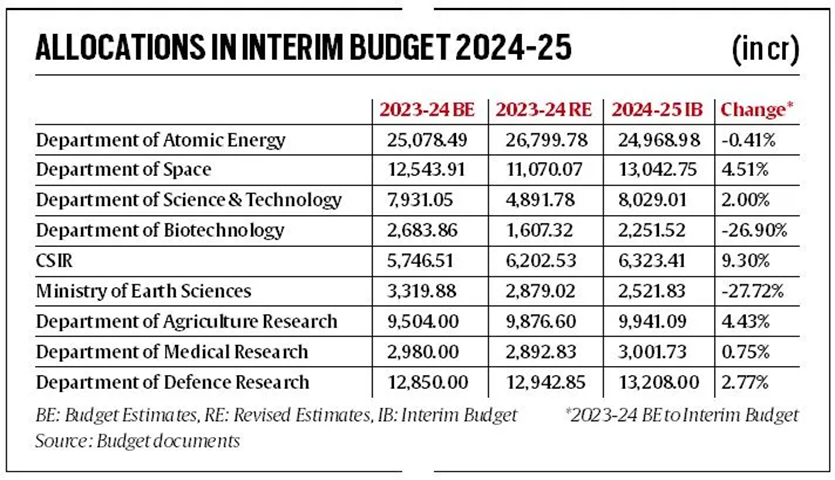Context:
In the Union Budget of 2024, Finance Minister Nirmala Sitharaman unveiled a series of measures aimed at bolstering India's research and development (R&D) sector, particularly focusing on deep technology (deep tech) and defense capabilities. These initiatives come at a critical juncture as India strives to position itself as a frontrunner in advanced and disruptive technologies, crucial for addressing global challenges and fostering economic growth. The allocation of a substantial corpus for R&D, coupled with plans to promote deep tech startups across various sectors, underscores the government's commitment to fostering innovation and technological advancement.

Understanding Deep Tech and Its Significance:
Deep tech refers to advanced and disruptive technologies, many of which are still in the developmental stage, with the potential to catalyze transformative change and offer solutions for future challenges. These technologies encompass cutting-edge research fields such as nanotechnology, biotechnology, materials science, quantum technologies, semiconductors, artificial intelligence, data sciences, robotics, and 3D printing. They are expected to play a crucial role in addressing complex global issues such as climate change, food security, pandemics, energy access, transportation, infrastructure, and cybersecurity.
Furthermore, advanced capabilities in deep tech are anticipated to boost productivity, drive economic growth, and generate employment opportunities in the coming years. Countries with strong foundations in these domains stand to gain a competitive edge. India, with its significant pool of skilled science and engineering professionals and an established technology ecosystem, sees itself well-positioned to lead in these areas. There is ample opportunity for India to contribute to the development of these technologies, fostering early adoption, indigenous innovation, intellectual property ownership, and self-reliance. Additionally, significant benefits such as spin-off technologies, skilled workforce development, entrepreneurship, and technology exports are expected to accrue from advancements in deep tech.
Government's Initiatives to Foster Deep Tech Ecosystem:
Over the years, the Indian government has launched several initiatives to incentivize research and innovation in deep tech domains. From establishing National Missions on Transformative Mobility and Quantum Technologies to formulating policies like the National Deep Tech Startup Policy (NDTSP), efforts have been made to create an enabling environment for tech startups and researchers. The NDTSP, awaiting government approval, aims to address key challenges faced by deep tech startups and facilitate collaboration between industry, academia, and research institutions. By nurturing talent, promoting innovation, and providing necessary support, these initiatives seek to build a robust ecosystem conducive to technological advancement.
Challenges in Research Funding and Policy Imperatives:
● One of the primary recommendations outlined in the NDTSP involves enhancing opportunities for securing long-term funding for research initiatives. This recognition stems from the understanding that most deep tech projects demand significant time and financial resources.
● A prominent concern within the scientific community has been the insufficient allocation of research funds. India's research expenditure falls well below the global average and lags behind scientifically advanced nations it competes with.
● Despite the Indian government's longstanding goal of dedicating at least 2% of GDP to research and development for over two decades, actual spending has not met this target. While there has been an increase in absolute spending, the proportion of GDP allocated to research has declined in recent years, currently standing at only about 0.65%. This contrasts sharply with the global average of approximately 1.8%.
● Recent government decisions suggest a belief that significant increases in R&D spending can only be achieved through collaboration with the private sector. Initiatives are underway to foster better cooperation between industry, research institutions, and educational establishments, aiming to diversify research activities and bolster funding sources. The establishment of the National Research Foundation (NRF), which commenced operations recently, aims to facilitate this objective, with approximately 70% of its Rs 50,000 crore allocation over the next five years expected to be contributed by private industry.
●
Union Budget's Focus on Research Funding:
● The Rs 1 lakh crore corpus allocated for research and development financing is crucial, particularly for startups and private sector ventures seeking seed funding. The aim is to stimulate investment within the research ecosystem, with the hope that successful projects will encourage further industry investment, leading to overall growth and benefit for the research community.
● However, skepticism persists within the scientific community. Past experiences have shown that private sector investment in research can be inconsistent and insufficient. Many scientists argue that there is an imbalance between expectations placed on the private sector and the government's funding commitments.
● Even when funds are available, project progress is often hindered by delays and bureaucratic hurdles. The current reliance on new government initiatives to inject funds into research underscores the importance placed on their success.
● Despite this, budgetary allocations for science and research departments in the Interim Budget show only marginal increases. The Council of Scientific and Industrial Research (CSIR), managing 37 labs, sees the highest increase at around 9%, while the Department of Space receives a mere 4% increment. Conversely, the Departments of Atomic Energy and Biotechnology, along with the Ministry of Earth Sciences, face budget reductions.
Conclusion:
In conclusion, the Union Budget's emphasis on deep tech and research funding heralds a new era of innovation and technological advancement in India. By prioritizing investments in R&D, fostering collaboration between stakeholders, and streamlining policy frameworks, the government aims to unleash the full potential of India's scientific community. However, realizing this vision requires concerted efforts to address funding constraints, streamline administrative processes, and cultivate a culture of innovation. As India navigates its path towards becoming a global hub for technology and innovation, sustained commitment from both the public and private sectors will be essential to drive meaningful progress and usher in a new era of prosperity.
|
Probable Questions for UPSC Mains Exam
1. Explain the significance of deep tech initiatives for India's research and development ecosystem. Assess the challenges hindering their implementation and suggest policy measures to overcome them. (10 marks,150 words) 2. Evaluate the role of public-private collaboration in fostering India's deep tech sector. Discuss the potential impact of increased research funding on innovation and addressing societal challenges. (15 marks, 250 words) |
Source – Indian Express







